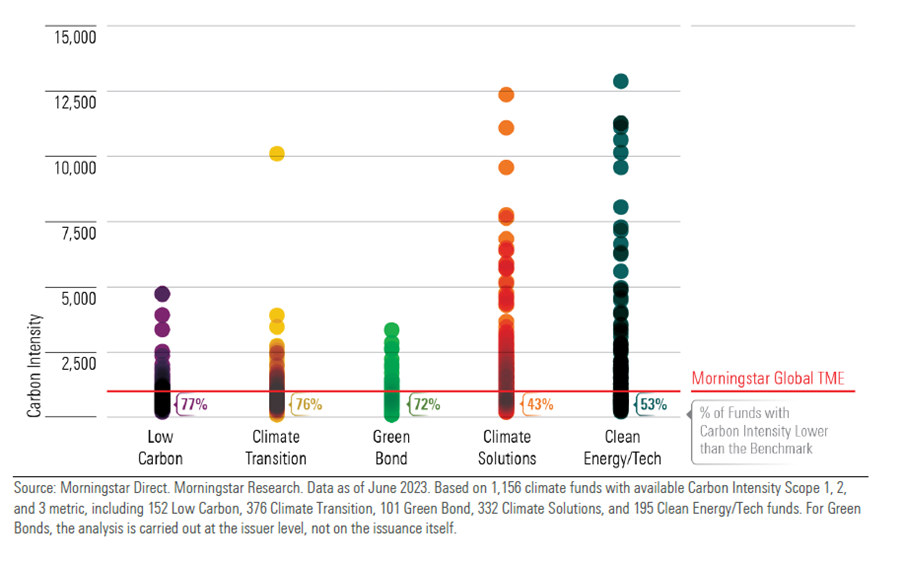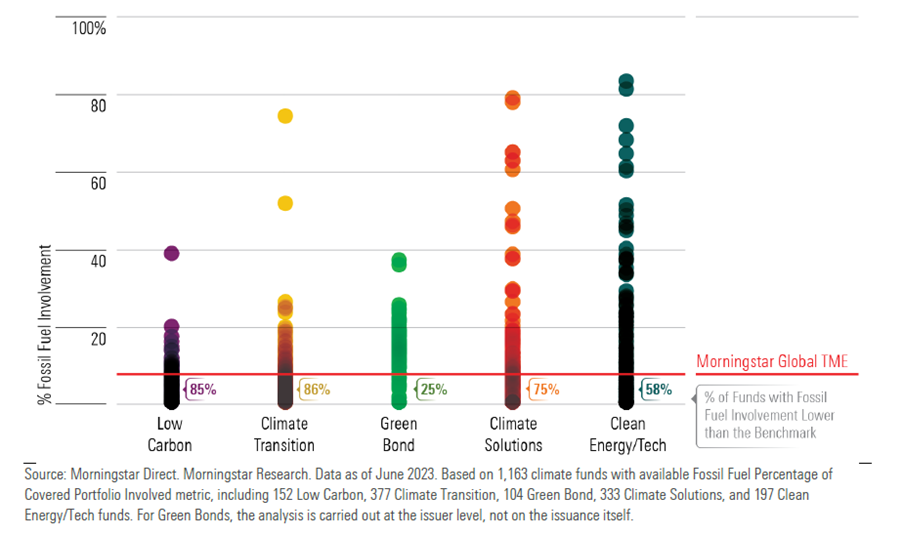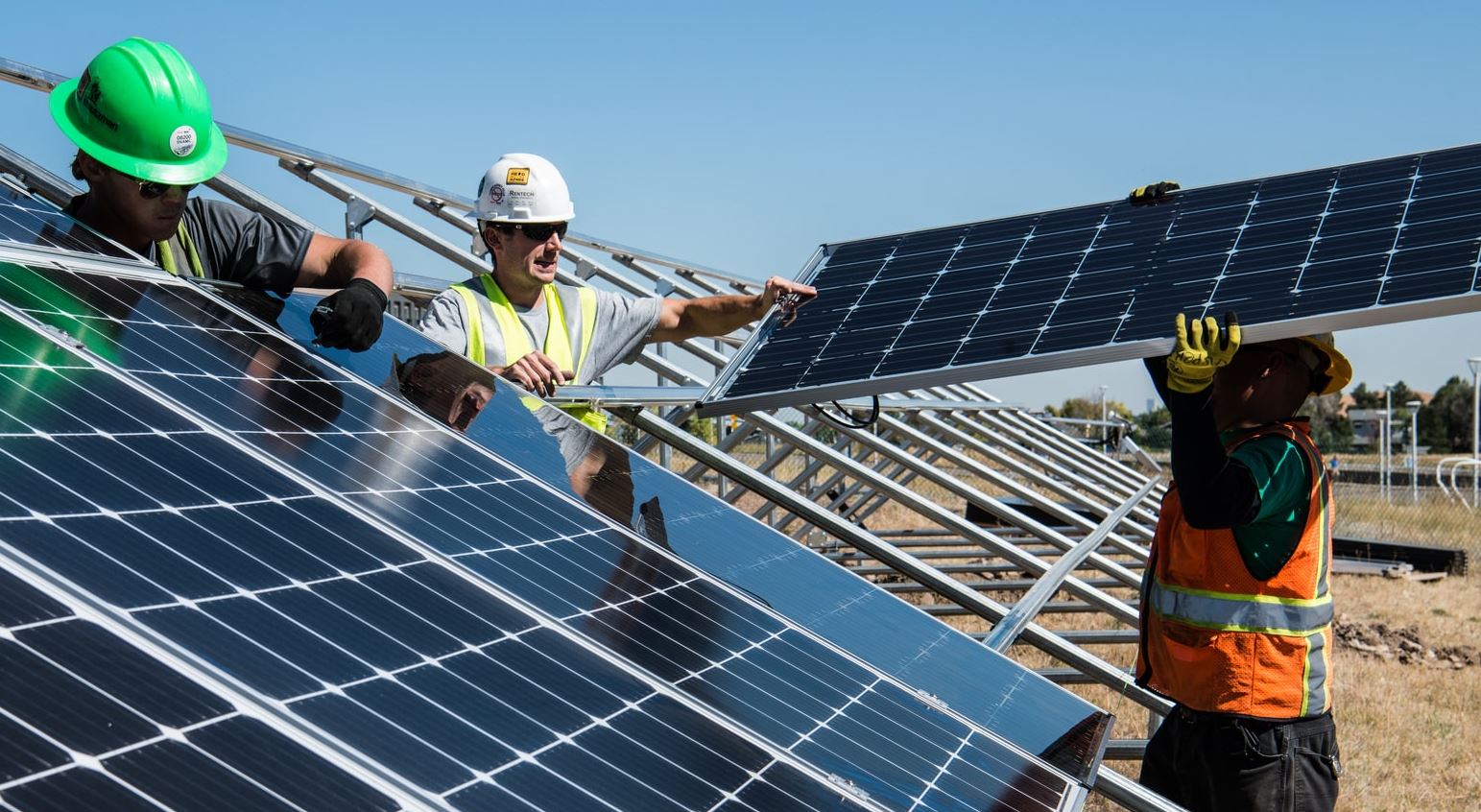
If you think that climate funds do not pollute, you are wrong. A Morningstar study reveals that, of 1,156 strategies analysed, the majority (63%) have a lower carbon intensity than a traditional basket of global stocks, as measured by the Morningstar Global Target Market Exposure index. But there is still a significant percentage that is higher.
Carbon intensity, which is calculated as the ratio of emissions to a company's revenues, is higher for carbon solution funds – which invest in companies that contribute to the low-carbon transaction through their products and services – and clean energy, which focus on renewables.
The table below shows how the funds in the different climate strategies compare to the Morningstar Global Target Market Exposure (TME) index. Among the clean energy funds, only 53% have a carbon intensity below the benchmark, a percentage that drops to 43% for climate solution funds, but rises to 77% for low carbon funds (they invest in securities with low carbon intensity) and 76% for climate transition (invest in companies that consider climate change in their business strategy).
Carbon Intensity for All Fund Groups Versus Morningstar Global TME Index (tCO2/USD Million)

"This reflects the fact that alongside pure-plays in the renewable energy sector like solar photovoltaic system manufacturers SolarEdge Tech and Enphase Energy, which score low on carbon intensity, many climate solutions and clean energy/tech portfolios invest in more-diversified companies that operate carbon-intensive businesses," says Hortense Bioy, global director of sustainability research at Morningstar. These currently high-emissions companies will be key drivers of the transition to a low-carbon economy.
Although the electric utilities industry is still very carbon-intensive, Denmark’s Ørsted [ORSTED] has significantly improved its carbon footprint in the past several years, following a divestment of its oil and gas assets, a significant reduction in its reliance on coal, and aggressive investment in wind energy.
Climate Funds Most Involved in Fossil Fuels
Another metric to understand why climate funds 'pollute' is their involvement in fossil-based activities, such as oil or gas production or thermal coal mining. The Morningstar study reveals that most climate trategies have less exposure to fossil fuels than the global equity index, but only 25% of green bond funds and 58% of alternative energy funds meet this criterion. Again, the reason for this is the presence of utilities in the portfolio, which invest in renewables but are still heavily dependent on fossil sources. For example, NextEra Energy (NEE), a leading wind farm and solar builder and operator in the US, still derives part of its energy mix from fossil fuels (thermal coal, oil and gas) and builds and operates gas pipelines.
Percentage of Fossil Fuel Involvement Versus Morningstar Global Target Market Exposure Index

Strategies Investing in Climate Solutions
While the climate-conscious investor must take into account having high carbon-intensive companies in the portfolio, he or she can also focus on funds that invest in climate solutions, such as clean energy generation, energy efficiency, green transport technologies and green building. According to the Morningstar study, 86% of climate solution funds and 95% of clean energy funds have an exposure to these industries that exceeds the global equity index. One of the most prominent stocks in these portfolios is EDP Renovaveis (EDPR), a renewable energy developer that builds, owns and operates power plants. This company focuses almost exclusively on wind (onshoreand offshore) and solar.
A Long Way to Net Zero
The fact that climate funds continue to pollute is not surprising if you consider that none of the major companies in their portfolios have an Implied Temperature Rise, or ITR, of 1.5°C or less, which means they are not in line with the Paris Agreement’s targets.
The ITR is an indicator calculated by Morningstar Sustainalytics, which, together with the "degree of alignment" to the trajectory of limiting temperature rise to 1.5°C, constitutes the Morningstar Low Carbon Transition Rating (LCTR), a rating that provides investors with a science-based and forward-looking assessment of a company's alignment to the trajectory of zero emissions by 2050.
According to Morningstar analysis, the major companies in the low-carbon strategies are overall the least aligned to 1.5°C trajectory (in terms of average values), but there are exceptions, including Redeia Corporacion [RED], which owns and operates the Spanish electricity grid. Alternative energy funds appear to be more in line with COP21, thanks mainly to companies such as Ørsted, which has solid management plans for the climate transition, and First Solar, which has set up an incentive scheme related to performance on greenhouse gas reduction, is transparent about emissions data and is a leader in renewables.




























